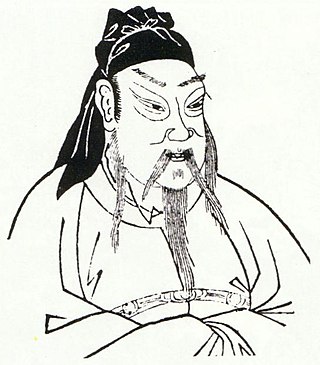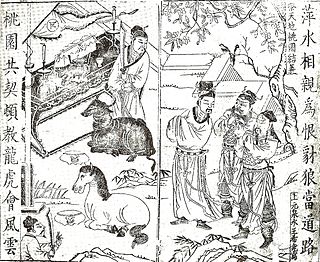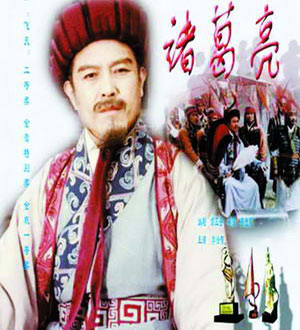
Romance of the Three Kingdoms is a 14th-century historical novel attributed to Luo Guanzhong. It is set in the turbulent years towards the end of the Han dynasty and the Three Kingdoms period in Chinese history, starting in 184 AD and ending with the reunification of the land in 280 by the Western Jin. The novel is based primarily on the Records of the Three Kingdoms, written by Chen Shou in the 3rd century.

Guan Yu, courtesy name Yunchang, was a Chinese military general serving under the warlord Liu Bei during the late Eastern Han dynasty of China. Along with Zhang Fei, he shared a brotherly relationship with Liu Bei and accompanied him on most of his early exploits. Guan Yu played a significant role in the events leading up to the end of the Han dynasty and the establishment of Liu Bei's state of Shu Han during the Three Kingdoms period. While he is remembered for his loyalty towards Liu Bei, he is also known for repaying Cao Cao's kindness by slaying Yan Liang, a general under Cao Cao's rival Yuan Shao, at the Battle of Boma. After Liu Bei gained control of Yi Province in 214, Guan Yu remained in Jing Province to govern and defend the area for about seven years. In 219, while he was away fighting Cao Cao's forces at the Battle of Fancheng, Liu Bei's ally Sun Quan broke the Sun–Liu alliance and sent his general Lü Meng to conquer Liu Bei's territories in Jing Province. By the time Guan Yu found out about the loss of Jing Province after his defeat at Fancheng, it was too late. He was subsequently captured in an ambush by Sun Quan's forces and executed.

Zhang Fei, courtesy name Yide (益德), was a Chinese military general and politician serving under the warlord Liu Bei in the late Eastern Han dynasty and early Three Kingdoms period of China. Zhang Fei and Guan Yu, who were among the earliest to join Liu Bei, shared a brotherly relationship with their lord and accompanied him on most of his early exploits. Zhang Fei fought in various battles on Liu Bei's side, including the Red Cliffs campaign (208–209), takeover of Yi Province (212–214), and Hanzhong Campaign (217–218). He was assassinated by his subordinates in 221 after serving for only a few months in the state of Shu Han, which was founded by Liu Bei earlier that year.
The Five Tiger Generals is a popular appellation in Chinese culture for the top five military commanders serving under one lord. Although the term does not appear in Chinese historical records and is not used officially, it has been heavily used in literature texts, folklore, as well as popular culture.

The Battle of Changban was fought between the warlords Cao Cao and Liu Bei in October 208 in the late Eastern Han dynasty of China. The battle took place at Changban.

The Oath of the Peach Garden is a fictional event in the 14th century Chinese historical novel Romance of the Three Kingdoms by Luo Guanzhong. This event is set at the end of the Eastern Han dynasty around the time of the Yellow Turban Rebellion in the 180s A.D. Liu Bei, Guan Yu and Zhang Fei took an oath of fraternity in a ceremony in the Peach Garden, and became sworn brothers from then on. Their goal in taking the oath was to protect the Han Empire from the Yellow Turban rebels. The oath bound the three men, who would later play important roles in the establishment of the state of Shu Han during the Three Kingdoms period. It is also often alluded to as a symbol of fraternal loyalty.

Diaochan was one of the Four Beauties of ancient China. Although based on a minor historical personage, she is mostly a fictional character. She is best known for her role in the 14th-century historical novel Romance of the Three Kingdoms, which romanticises the events in the late Eastern Han dynasty and the Three Kingdoms period. In the novel, she has a romance with the warrior Lü Bu and causes him to betray and kill his foster father, the tyrannical warlord Dong Zhuo. She was praised in tales as a woman of unrivaled beauty who did what no other hero in China was able to accomplish: put an end to Dong Zhuo's regime of terror and the eventual end of Lǚ Bu; triggering the events that would lead to the formation of the Three Kingdoms: Cao Wei, Eastern Wu, and Shu Han.

The Long Corridor is a covered walkway in the Summer Palace in Beijing, China. First erected in the middle of the 18th century, it is famous for its 728 m (2,388 ft) length in conjunction with its rich painted decoration.

Meng Da, courtesy name Zidu, was a military general of the state of Cao Wei during the early Three Kingdoms period of China. He previously served the warlords Liu Zhang and Liu Bei during the late Eastern Han dynasty before defecting to Wei. In Wei, he served under the first two rulers, Cao Pi and Cao Rui. Around late 227, he started a rebellion in Wei and aimed to rejoin the Shu-Han but the revolt was swiftly suppressed by the Wei general Sima Yi. Meng Da was captured and executed for treason.

The Green Dragon Crescent Blade is a legendary weapon wielded by the Chinese general Guan Yu in the 14th-century historical novel Romance of the Three Kingdoms. It is a guandao, a type of traditional Chinese weapon.

Zhang Bao was the eldest son of Zhang Fei, a general who served the warlord Liu Bei during the late Eastern Han dynasty and the state of Shu Han during the Three Kingdoms period of China. Little is known about Zhang Bao's life because Zhang Fei's biography in the historical text Records of the Three Kingdoms only mentioned that he was Zhang Fei's eldest son and that he died early.

Kessen II is a strategy game loosely based on the Three Kingdoms period of China. It is the sequel to Kessen in name only; both Kessen and the later sequel Kessen III are based on events in Japan and China. The gameplay involves playing out major battles as the storyline progresses, with cutscenes between each battle for the development of the events and major characters. Before battle, players are given a choice of strategies to take, although they can manually control all units in the battlefield. All units are controlled by the AI unless the player directly intervenes, and battles between forces are carried out in real-time. While in control of a unit, players are able to use special skills or magic spells to turn the tables, although enemy characters are also able to do so.

Romance of the Three Kingdoms is a Chinese television series adapted from the classical 14th century novel of the same title by Luo Guanzhong. The series was produced by China Central Television (CCTV) and was first aired on the network in 1994. It spanned a total of 84 episodes, each approximately 45 minutes long. One of the most expensive television series produced at the time, the project cost 170 million yuan. It was completed over four years and involved over 400,000 cast and crew members, including divisions of the People's Liberation Army from the Beijing, Nanjing and Chengdu military regions. Some of the dialogue spoken by characters was adapted directly from the novel. Extensive battle scenes, such as the battles of Guandu, Red Cliffs and Xiaoting, were also live-acted.

The Battle of Bowang, also known as the Battle of Bowang Slope, was fought between the warlords Cao Cao and Liu Bei in 202 in the late Eastern Han dynasty.

Three Kingdoms is a 2010 Chinese television series based on the events in the late Eastern Han dynasty and the Three Kingdoms period. The plot is adapted from the 14th century historical novel Romance of the Three Kingdoms and other stories about the Three Kingdoms period. Directed by Gao Xixi, the series had a budget of over 160 million RMB and took five years of pre-production work. Shooting of the series commenced in October 2008, and it was released in China in May 2010.

K.O. 3an Guo is a Taiwanese television series starring George Hu, Xiu, Kirsten Ren, and three out of four members of Fahrenheit as special guests, who starred in the prequels. The title is pronounced as K.O.-san-guo. It is the third installment of the Zhong Ji series; preceded by KO One and The X-Family. This series is a spoof of the 14th century Chinese historical novel Romance of the Three Kingdoms by Luo Guanzhong.

The Lost Bladesman is a 2011 Hong Kong-Chinese historical war and biopic action film loosely based on the story of Guan Yu crossing five passes and slaying six generals in the 14th-century historical novel Romance of the Three Kingdoms. Written and directed by Alan Mak and Felix Chong, the film starred Donnie Yen as Guan Yu, with Yen also serving as the film's action director.

Zhuge Liang is a Chinese television series based on the life of Zhuge Liang, a chancellor of the state of Shu Han in the Three Kingdoms period. The plot is based on stories about Zhuge Liang in the 14th-century historical novel Romance of the Three Kingdoms. The series starred Li Fazeng as the title character and was first aired on Hubei TV in mainland China in 1985. The show has been applauded for its historically accurate sets and costumes.

















